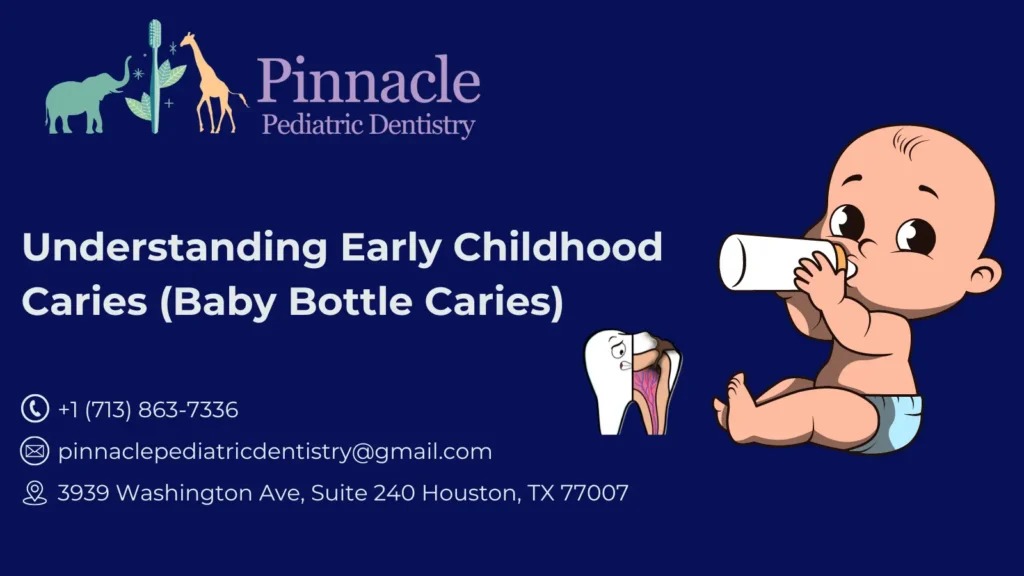Understanding Early Childhood Caries (Baby Bottle Caries)

Early childhood caries, also widely known as “baby bottle caries” or “nursing bottle caries,” is a significant dental concern that can affect young children. This form of tooth decay is not just common but also can be quite severe if not addressed promptly.
Here, we delve into what causes early childhood caries, the risks associated with it, and practical steps you can take to prevent this condition from affecting your child’s oral health.
What is Early Childhood Caries?
Early childhood caries (ECC) is a form of cavities that occurs in young children. This condition is closely associated with frequent and prolonged exposure of a child’s teeth to sugary liquids.
Common sugary liquids which causes baby bottle caries include milk (even breast milk), formula, fruit juice, and sweetened drinks such as sports drinks, Pediasure, and soft drinks.
How Does Baby Bottle Caries Occur?
The mechanism behind early childhood caries is quite straightforward yet alarming. When a baby is put to bed with a bottle containing any liquid other than water, the sweet liquid tends to pool around the child’s teeth.
This scenario provides a perfect breeding ground for plaque bacteria. These bacteria feed on the sugars present in the liquid, producing acids that attack the tooth enamel, leading to cavities.
The Dangers of Baby Bottle Caries
The rapid development and progression of cavities due to ECC can lead to severe dental problems. Not only does this condition cause pain and discomfort for the child, but it can also lead to more serious oral health issues down the line, including infections and difficulties with eating or speaking.
Preventative Measures to Avoid Nursing Bottle Caries
Preventing early childhood caries is crucial for maintaining your child’s oral health. Here are several strategies you can implement to protect your little one from this condition:
1. Water Only at Bedtime
If you must give your child a bottle at bedtime or naptime for comfort, ensure it contains only water. This simple measure can significantly reduce the risk of Early Childhood Caries by eliminating the child’s teeth’s exposure to sugar during these periods.
2. Gradual Weaning Off Sugary Liquids
If your child insists on having a bottle of milk, formula, or juice to fall asleep, start diluting the bottle’s contents with water gradually. Over a period of two to three weeks, increase the water ratio until the bottle contains only water.
This method can help ease the transition for your child without abruptly changing their routine.
3. Proper Oral Hygiene Practices
After each feeding, it’s essential to clean your baby’s gums and teeth. This can be done using a soft toothbrush, a damp washcloth, or a gauze pad. The goal is to remove any plaque that may have formed, thereby reducing the risk of acid production that leads to tooth decay.
For convenience and effectiveness, sit down and place the child’s head in your lap, or lay the child on a dressing table or the floor, ensuring you can easily see and access the child’s mouth.
Final Thoughts about Early Childhood Caries
Early childhood caries is a preventable condition that requires awareness and proactive prevention measures from parents and caregivers. By understanding the causes of Nursing Bottle Caries and implementing the strategies outlined above, you can play a pivotal role in safeguarding your child’s oral health.
Regular dental check-ups, starting from the age of one or when the first tooth appears, are also crucial in preventing and managing Baby Bottle Caries. Remember, early prevention not only promotes better oral health but also sets the foundation for a lifetime of healthy smiles.
